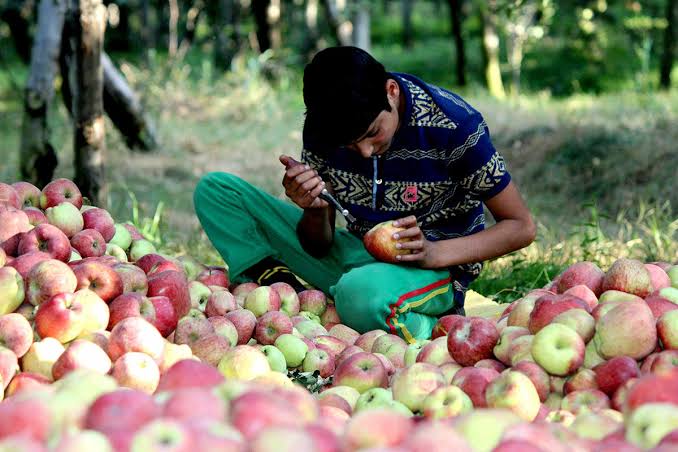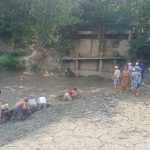Kulgam, July 24: The prolonged dry spell coupled with an intense heat wave is affecting the health of fruit-bearing trees across South Kashmir.
Farmers from different villages told Rising Kashmir that moisture deficiency has stressed fruit-laden trees, causing symptoms of various nutritional imbalances.
“We grow apples on six kanals of land. This year, there has been an increased incidence of pests in my orchard,” said Javid Ahmad, a farmer.
He added that despite spraying insecticides twice, the after effects of aphids were detrimental.
He noted that sooty mold affected the leaves and fruit quality, necessitating additional chemical sprays to control it. While combating sooty mold, leaf miner blotch and powdery mildew started emerging, posing new challenges.
The farmers said that despite irrigating their orchards, the heat-induced stress has triggered premature fruit fall in July. “Usually, the fruit fall occurs in June, but this season it is strangely happening in late July,” the farmers said.
The farmers have urged the Horticulture Department authorities to assist them in addressing the challenges posed by this year’s hot and dry climate.
Nisar Ahmad, District Horticulture Officer, Kulgam, told Rising Kashmir that the heat wave and dry spell have significantly affected orchards, and growers are advised to irrigate their orchards as per the advisory.
He said the dry spell has led to significant lenticel blotch in orchards due to calcium deficiency. “The dry spell over the past few months has had substantial effects on plants, and wherever irrigation is available, growers have utilized it.”
The department has advised growers to irrigate their orchards only after the temperature dips during the day.
“Irrigation helps to minimize the impact of the heat wave. Calcium deficiency during a dry spell leads to lenticel blotch. Growers can contact our HDOs or our district health clinic for timely advice,” he said.
He said that the adverse effects of the heat wave have started to appear in the plants, potentially impacting fruit development. Therefore, timely irrigation is crucial wherever possible.
“In high-density orchards, irrigation options are already available. Also, in areas with sandy soil types, irrigation every 10 to 15 days is necessary due to the intense heat wave,” he said.
For growers without access to irrigation, he suggested mulching as a way to cover and protect the plants. “The horticulture department has issued an advisory on how to save orchards from the heat wave. Another method is whitewashing, which can help protect the tree stems,” he added.










